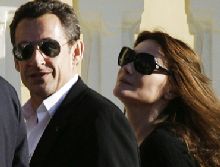France: arrest of former newspaper publisher sparks protests
 The treatment of Vittorio Filippis, former publisher of Libération,
The treatment of Vittorio Filippis, former publisher of Libération,
signals the deteriorating situation for the media in France. Natasha Lehrer reports
(more…)
 The treatment of Vittorio Filippis, former publisher of Libération,
The treatment of Vittorio Filippis, former publisher of Libération,
signals the deteriorating situation for the media in France. Natasha Lehrer reports
(more…)
French satirist Maurice Sinet has launched a new magazine he claims will champion free speech. Ruth Michaelson looks back at the very French circumstances surrounding this move
(more…)
 A recent French court decision leaves us no closer to the truth about footage that shook the Middle East, writes Natasha Lehrer
A recent French court decision leaves us no closer to the truth about footage that shook the Middle East, writes Natasha Lehrer
A seven-year debate over the authenticity of the footage of the death of Mohammed al Dura in the arms of his father Jamal reached a new stage on 21 May when the Paris Court of Appeal overturned a defamation verdict against blogger Philippe Karsenty.
In 2004 Karsenty joined the chorus voicing scepticism about the al Dura footage. He accused the veteran France 2 Middle East correspondent Charles Enderlin, who provided the voiceover for the report from Gaza, which was filmed by freelance cameraman Talal Abu Ramah, of knowingly having broadcast faked footage of the shooting at the Netzarim Junction on 30 September 2000. Enderlin and France 2 have consistently rebutted this accusation and have so far taken four bloggers, including Karsenty, to court. In the original court case, in 2006, the court did not demand that France 2 hand over the rushes. Karsenty was found guilty of defamation.
(more…)
 As President Nicolas Sarkozy visits Britain, Natasha Lehrer looks at the changing relationship between France’s political elite and the media
As President Nicolas Sarkozy visits Britain, Natasha Lehrer looks at the changing relationship between France’s political elite and the media
In a radical break with French tradition, the amorous antics of the country’s President have lately become fair game for the French press. Famously, de Gaulle was the only post-war president to have remained faithful to his wife. President Mitterrand’s mistress and daughter lived in elegant anonymity for 20 years in a stunning rive gauche apartment, with rent was paid by the state, untroubled by any press intrusion into the couple’s private life whatsoever. But since Sarkozy came to power the hallowed French tradition of respect for the private lives of the famous and powerful appears to have begun to change.
As recently as last May, the old pieties regarding privacy were still being spouted when it was ‘revealed’ that the presidential candidate, Segolène Royal, had officially split up with her long-time partner, Socialist Party (PS) leader François Hollande. That there was trouble in paradise between the first couple of the PS was one of the worst kept secrets in Paris, but sticking to the old-fashioned Mitterand principle, no mention of it had ever appeared in the media, even in the outlets who favoured a win by Sarkozy. Worse, when it did come out, in a press release from Royal herself, there was a palpable sense of outrage amongst the Parisian chattering classes that the cardinal rule that the hoi polloi has no business knowing anything of the intimate lives of those in the public eye had been broken.